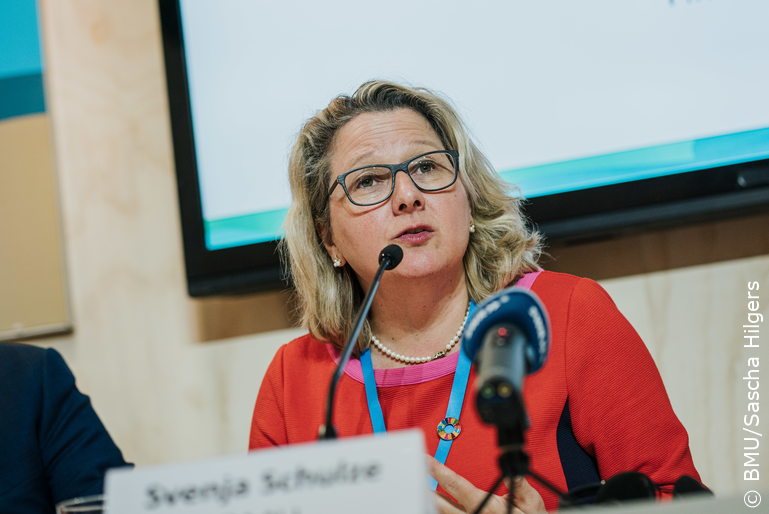Published on December 10, 2019
During a press briefing on 10.12.2019 in the German Pavilion at the Climate Conference COP25 in Madrid, German Environment Minister Svenja Schulze announced the international Power-to-X Secretariat, implemented by GIZ, and outlined its strategy.
In order to meet the goal set in the Paris agreement and limit climate change to well below 2°C a nearly total decarbonisation in all sectors is needed. This is only possible through the extensive use of renewable and therefore CO2-free power generation. But in numerous economic sectors and processes direct use of electricity is not possible. So are for example aviation and maritime shipping still completely depend on fossil fuels. Power-to-X makes renewable energies compatible and applicable for these sectors and processes.
Power to X uses electrolysis to produce hydrogen out of water. This hydrogen is then converted into synthetic fuels (e.g. kerosene) or feedstock. When only using additional renewable energies PtX can be used almost climate-neutrally – even in aviation and maritime shipping.
With partners in Chile and Brazil, GIZ already supports pilot Power-to-X projects:
Since 2014 GIZ advises the Chilean Government and market actors such as Energy utilities and technology provider on the potential of green hydrogen for Chile. An economic valuation tool was created, a national hydrogen association was founded, a hydrogen handbook was published and the largest international hydrogen conference with 420 participants was organized. These efforts initiated several commercial projects all over Chile.
In Brazil GIZ supported a research plant at the National Agency of Petroleum, Natural Gas and Biofuels (ANP) with a production capacity of 10 liters/day. Based on these experiences GIZ and partners are now working on a pilot production plant at a remote airport in the middle of the Amazonian jungle. To provide fuel for planes at the airport, the kerosene is transported by air – with high costs and low efficiency. Producing up to 1000 liters of synthetic kerosene per day, Power-to-X reduces emissions and inefficiency and can lower costs for kerosene.
To facilitate a global breakthrough in sustainably produced synthetic e-fuels and feedstocks in sectors that cannot directly use renewable electricity, the German Environment Ministry now launched the international Power-to-X Secretariat. The secretariat is implemented by GIZ and based in Berlin, Germany.
With the secretariat the German government wants to build international networks and partnerships to share knowledge and tap market potentials. The secretariat will also promote the sustainable and efficient use of the technology and therefore actively shape the discussion surrounding sustainability criteria for producing PtX.
For GIZ the implementation of the secretariat is a logical next step to bring the existing local projects closer together as well as help to elaborate new business cases and facilitate market opportunities for Power-to-X adoption. In this connection, GIZ will work with its global network to further develop capacities in partner countries by providing training courses and e-learning tools.


